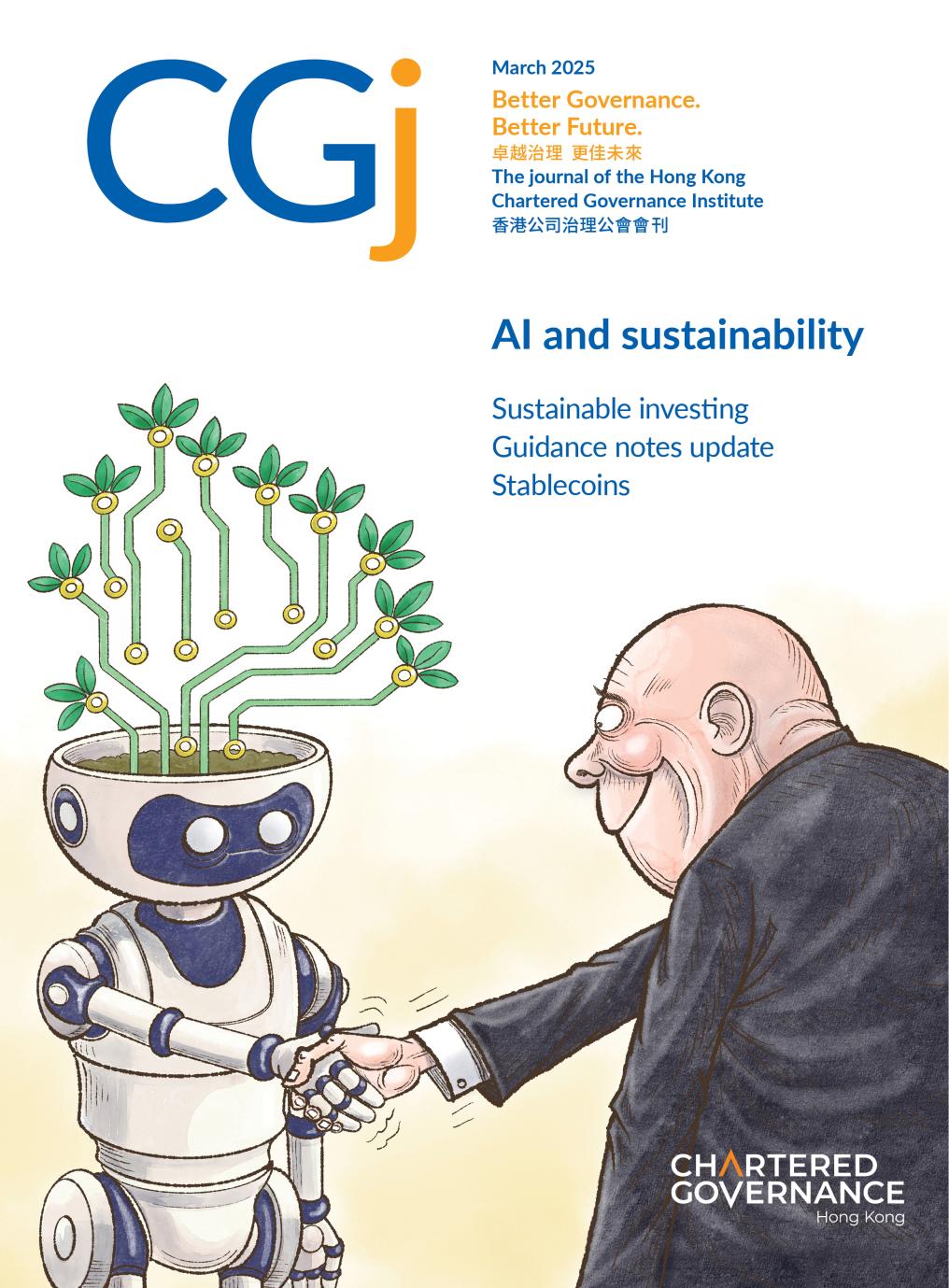This month’s interview in the GoldenGen Reflections series is with April Chan FCG HKFCG, Institute Past President.
When did you first join the Institute and what was your professional role at that time?
‘I joined the Institute in 1981 as a member and became a Fellow in 1994. I supported the Institute on an ad hoc basis until I was elected to Council in 2004. I was Institute Vice-President from 2008 to 2009 and served as President from 2010 to 2011. I retired in 2016 as the Company Secretary of CLP Holdings Ltd, having served the CLP Group for 27 years.’
Did membership of the Institute support your career development and, if so, in what ways?
‘Absolutely. Being a member of the Institute and earning its professional qualification was instrumental to my career. It helped build my professional network, which was particularly useful when working in a listed company in terms of sharing best practices and practical experience.
The Institute has worked tirelessly to gain recognition from regulators. The endorsement of the Chartered Secretary (CS) qualification in the Companies Ordinance and the Listing Rules, for example, meant that listed companies were then required to appoint qualified company secretaries. This recognition not only improved career advancement opportunities, but also helped raise the professional standards in Hong Kong as an international financial hub.’
What has motivated your ongoing contribution to governance as a profession?
‘The Institute is always in my heart. Over the years, I’ve held several roles within the Institute. Apart from being its President, I served on numerous committees, both as a member and as Chairman. Even after retiring in 2016, my passion for governance and professional development has kept me engaged. I led practical company secretarial workshops, covering topics such as board dynamics, effective board meetings, board evaluation and other board advisory skills. These workshops were interactive, with exercises and discussions, allowing me to share my decades of experience while learning from younger members. Coaching young members has been especially rewarding – their energy and fresh perspectives have inspired me to rethink traditional approaches and I value the mutual learning process.’
What would you say are some of the most significant milestones in the Institute’s development?
‘During my presidency, we focused on development in three main directions – locally, regionally and internationally.
Locally, in Hong Kong, we launched the Mandatory Continuing Professional Development Programme in 2011, requiring all members to complete 15 hours of training annually. This is widely acknowledged by market practitioners, regulators and employers as an effective way of improving an individual’s professional skills and of raising industry standards. I also chaired the Technical Consultation Panel, which explores regulatory developments and advocates for practical changes that benefit listed companies and trust or company service providers. To date, the panel has published more than 150 Guidance Notes and 40 research papers, enhancing members’ knowledge and standards.
In regional development, the Institute had already set up the Beijing Representative Office in the Chinese mainland in 1996. Then, in 2010, we established four Regional Board Secretary Panels in Beijing, Shanghai, Guangzhou and Shenzhen. These panels facilitated discussions and networking opportunities about issues unique to mainland-listed companies, and fostered collaboration with mainland regulators. For example, the signing of an MOU with the Shanghai Stock Exchange in 2011 was a big step forward in terms of enhancing awareness of our profession in the mainland.
On the international front, to amplify our global voice, we co-founded the Corporate Secretaries International Association (CSIA) in 2010 with other governance institutes in our global network. As its inaugural President, I worked to promote international collaboration and recognition of governance professionals. Nowadays, the Institute plays an important role in both CGI and CSIA, and it has been wonderful to witness its evolution from being simply CGI’s Hong Kong Division into the professional body it is today, with strong membership and financial strengths, as well as good standing in the governance profession locally and overseas. These milestones represent the collective efforts of many dedicated individuals, including members of the Secretariat, the Council and its committees.
What advice would you give to the younger generation starting out on their governance careers?
‘I believe young professionals should embrace what I think of as the 5 Ps of life. First, Principles – governance professionals must have integrity and uphold principles like accountability and transparency in communications with their shareholders and other stakeholders. Second, Perseverance – challenges are inevitable, but persistence is key. Learn from good governance practices and apply them appropriately to your organisation, even if you encounter opposition. Third, Patience – change takes time. Cultural shifts often face resistance, so be patient and work to bring about a convergence of opinion. Fourth, Passion – love what you do and take pride in your work. Be a sponge – absorb knowledge and best practices from others. And finally, Preparedness – always be ready for challenges before opportunities arise. When the right moment comes, you’ll be able to seize it and shine.
Also, don’t be afraid of hard work and don’t worry about being underestimated. Remember – employers give opportunities to those who are ready, so do your best, prepare yourself and take every chance to grow.’
coaching young members has been especially rewarding – their energy and fresh perspectives have inspired me to rethink traditional approaches and I value the mutual learning process
April Chan FCG HKFCG
Institute Past President
本期的睿思智享系列采访了公会前会长陈姚慧儿女士FCG HKFCG。
您是什么时候加入公会的?当时您的专业身份是什么?
‘我于1981年以会员身份加入公会,并于1994年成为资深会士。最初我在公会有需要的时候临时帮忙,后来到2004年当选为理事会成员。2008年至2009年,我担任公会副会长,2010年至2011年担任会长。2016年从中电控股有限公司的公司秘书职位退下来,结束了在中电27年的服务。’
公会的会员资格是否有助于您的职业发展?如果有,在哪些方面?
‘当然有帮助。成为公会会员并获得专业资格,对我的职业发展至关重要。公会会员的身分帮助我建立专业网络, 这在上市公司工作时尤其有用,可以和其他会员分享最佳实践和实际经验。
公会为获得监管机构的认可做出了不懈努力。例如,公司条例和上市规则认可了特许秘书资格,意味着上市公司必须任命合格的公司秘书。这种认可不仅有助于职业发展,也 提升了香港作为国际金融中心的专业水平。’
是什么促使您持续推动公司治理这一专业领域的发展?
‘我始终心系公会。多年来,我在公会担任过多个角色 。 除了担任会长外,还服务许多委员会,既做过委员,也当过主席 。即使在2016年退休后,我对公司治理和专业发展的热情仍然不减 。我主导了公司秘书实务工作坊,涵盖董事会运作、高效董事会会议、董事会评估及其他董事会咨询技巧等主题 。这些工作坊以互动形式进行,包括练习和讨论,让我在分享自己数十年经验的同时,也能向年轻会员学习。指导年轻会员尤其让我获益良多。他们的活力和新视角启发我重新思考传统方式,我很珍视这种相互学习的过程。’
您认为公会历史上有哪些重要的里程碑?
‘ 在我担任会长期间,我们的发展重点围绕三个主要方向:本地、区域及国际层面。
在本地层面,我们于2011年推出了强制性持续专业发展政策,要求所有会员每年完成15小时的培训 。该计划广受市场从业者、监管机构及雇主认可,被视为提升个人专业技能及提高行业标准水平的有效方式 。此外,我还担任专业知识谘询小组主席,该小组负责研究监管动态,并倡导对上市公司及信托或公司服务提供者有利的务实变革。至今,该小组发表了超过150篇指引说明及40份研究报告,帮助会员提升知识和专业水平。
在区域扩展方面,公会早在1996年便在中国内地设立了北京代表处。随后,在2010年,我们在北京、上海、广州和深圳成立了四个区域董事会秘书小组,提供交流平台,探讨与內地上市公司相关的议题,并促进与内地监管机构的合作。例如,2011年我们与上海证券交易所签署了合作备忘 录,这是提升内地对本专业认知的重要一步。
在国际化发展方面,为了扩大我们的全球影响力,我们于2010年与全球其他有联系的治理机构共同创立了公司秘书国际联合会。作为其创会会长,我致力于促进国际合作,并提升治理专业人士的认可度。如今,公会在公司治理学会及公司秘书国际联合会中均扮演着重要角色。见证公会从公司治理学会香港分会成长为如今这一具有强大会员基础、 稳健财政,并在本地及国际治理领域享有良好声誉的专业机构,我深感欣慰。这些里程碑成就全赖众多敬业人士的共同努力,包括秘书处、理事会及各委员会成员。’
您对刚刚开始治理生涯的年轻一代有什么建议?
‘我认为年轻专业人士应当坚持我所称的生命中的“5P”。 首先是原则(Principles),治理专业人士必须坚守诚信,并在与股东及其他持份者沟通时,贯彻问责性和透明度等核心原则 。其次是毅力(Perseverance),挑战在所难免, 但坚持是关键 。学习良好的公司治理实践 ,并适时应用于你的组织,即使遇到阻力也不要轻易放弃。第三是耐性(Patience),变革需要时间,文化转变往往会遭遇阻力, 因此要有耐心,努力促成共识。第四是热诚(Passion), 热爱自己的工作,并以此为荣 。要像海绵一样,向他人学习,吸收知识和最佳实践,不断提升自己 。最后是准备(Preparedness),在机会到来之前,始终做好迎接挑战的准备。当合适的时机出现,你就能把握住并脱颖而出。
此外,不要害怕工作艰辛,也不用担心被低估。请记住,雇主会把机会留给有准备的人,所以请尽力而为,提升自己, 抓住每一个成长的机会。’


